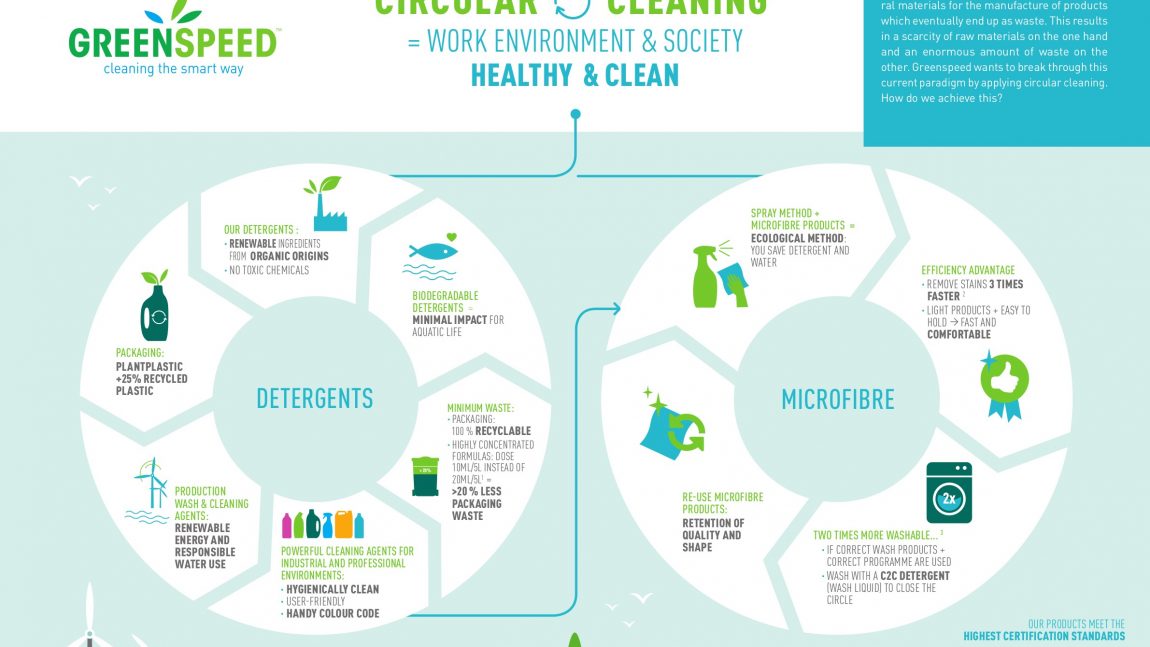The topic of how cleaning materials impact both our health and the world around us remains very relevant in light of the COVID pandemic. Considerate suppliers Janitorial Express Eco aspire to “Accelerate the Worlds Transition to Sustainable Cleaning”. Here we share some extracts from a speech made by their Managing Director Gary Fage earlier this year, before the lockdown. Gary also holds the position of Senior Warden of the Worshipful Company of Environmental Cleaners and was part of the UhUb Time for Action 2020 Sustainability event at the World Wildlife Fund (WWF) headquarters. His speech focused on the future of greener cleaning and how this can be part of the growing circular economy.
“I am a keen supporter of the Ellen MacArthur Foundation which promotes a circular economy and I am also an advocate of Cradle to Cradle or C2C Product Accreditation. This accreditation is in my opinion the highest indication available of a product’s Efficacy and Environmental Credibility. “
“There is absolutely no doubt in my mind that there is a shift in the nation’s mood surrounding climate change, I would be very surprised if at least one of your clients or stake holders has not already asked you what you are doing about this problem.
I would encourage your business to participate in a Circular Cleaning revolution that can not only impact positively on the environment but also your bottom line.”
Cradle to Cradle
“Cradle to Cradle Design is a biometric approach to the design of products and systems that models nature’s processes, viewing materials as healthy and safe nutrients. The C2C maxim is “Waste equals food”
“The world is definitely changing, and I see environmentally positive vegetable-based products and probiotic cleaners replacing 90% of traditional commercial cleaning products within 5 years, as more and more companies embrace the concept of the Circular Economy.”
“The Olympia Exhibition Centre in London have embraced circular cleaning as part of the Circular Economy. We worked closely with the iconic Olympia venue, to ensure that they are at the very forefront of environmentally considerate commercial cleaning. By using concentrated Cradle to Cradle Accredited (C2C) probiotic cleaning products where 1L of concentrate makes 100 bottles of ready to use product.
Olympia’s Cleaning Manager Kristina Jearrad explained how she was very sceptical of the efficacy of so called “green” products. And how she was originally using 20 different chemicals and is now using only 3 Probio Cleaners to clean the entire venue. She Spoke of the massive benefits it now brings to the health of her cleaners, their reduced cost, reduced carbon impact and the reduction in storage space needed.
“In addition to this my company collect all the C2C plastic bottles when making our next delivery and then have them transported by Elliot Lancaster’s company iRecycle, they are then taken along the canal system by barge to a specialist plastic recycling centre, thus completing the circle.”
The impact of fossil-fuel based cleaning products on the health of Cleaners
“A recent study by the University of Bergen in Norway has found that using conventional cleaning products can be as harmful as smoking 20 cigarettes a day.
Reductions in the use of Petro-Chemical based cleaners, will:
- Reduce your carbon footprint and positively impact Global Warming,
- Improve the quality of water reaching the sea via our sewage systems.
- Cut down on your staff’s exposure to potentially harmful chemicals.
In my opinion we need to stop using conventional cleaning products and start to harness the power of friendly bacteria”
Pro-Biotics and Hospital Acquired Infections HAI’s
“A study indicating that cleaning with Probiotics can be an effective strategy against Hospital Acquired Infections, may well have implications in commercial buildings.
The study carried out by Dr Robin Temmerman in Belgium indicates that cleaning with probiotics lowered the presence of H-A-I associated microorganisms on hard surfaces.
It compared conventional cleaning procedures using petrochemical based cleaners, to a probiotic cleaning regime. The results were very positive without significantly lowering the total microbial counts, i.e. good bacteria replaced the bad bacteria.
Microbial cleaning, as part of the daily cleaning protocol, resulted in a reduction of HAI-related pathogens by 50 to 89%. This effect was achieved after 3 to 4 weeks and the reduction in the pathogen load was stable over time
In layman’s terms the way probiotics work is by totally overpopulating a surface with food grade bacteria which then compete with the pathogens for food sources and ultimately there can be only one winner.
Although conducted to measure the effectiveness of probiotic cleaning products on the spread of pathogens in hospitals, it could logically be concluded that similar effects would be seen in a workplace environment.
Further circumstantial evidence comes from trials my company did recently in a large building in the City of London where the contractor noted a “significant reduction” in staff absenteeism during the trial period, part of which spanned the Christmas break.
Sir David Attenborough recently said ‘we’re running out of time to save the planet’ “Right now we are facing our greatest threat in thousands of years. Climate change. Many businesses believe that making environmentally positive changes to the way they work will cost more money, in my experience this is not the case.
You now have the opportunity to make a positive impact on Global Warming, the World’s Oceans and the health of your staff and clients alike.



